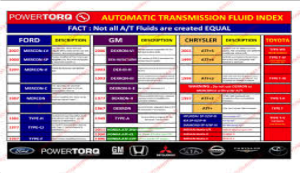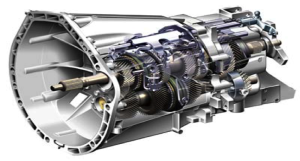In today’s automotive world full of advancing technology you have to pay close attention to all of your vehicles fluids to avoid using the wrong ones. Although there are several different fluids critical to your vehicle’s operation, there is none that is more important and easily confused as the transmission fluid. We are way past the good old days of Merc/Dex III and are now in an Alice in Wonderland scenario with every auto manufacturer requiring something different for their vehicles, and sometimes multiple fluids at that. Let’s touch on some key basics then get into a little bit of need to know technical stuff, before I scare you to death with the possible “what if’s” when it comes to using the wrong fluid.
What is a Transmission Fluid? Transmission fluid is a lubricant that aids in cooling and maintaining hydraulic pressure, which drives the transmission through its various speeds. The fluid is highly specialized oil optimized for the special requirements of a transmission such as; Valve operation, Brake band friction, the torque converter, and Gear lubrication.
“Transmission fluid is like water for your aquarium if you don’t have and maintain the proper PH level in an aquarium you can kill all of your fish.”
There are many different types of automatic transmission fluid on the market. Each has its own special blend of oils, chemicals and solids designed to provide the absolute best lubrication properties while still allowing bands and clutches to apply without slipping. Most automatic transmissions have a similar design, but the main differences come from the materials the parts are made out of and the different pressures and operating temperatures each one has………..and they are all different!
Here is a quick rundown on the most popular transmission fluids from the most popular manufacturers,
Type F — Introduced by Ford in 1967 for their automatics. Also used by Toyota.
Type CJ — Special Ford fluid for C6 transmissions (similar to Dexron II) Must not be used in automatics that require Type F.
Type H — Another limited Ford spec that differs from both Dexron and Type F. Can be replaced with Mercon.
Mercon — Ford fluid introduced in 1987, very similar to Dexron II. OK for all earlier Fords, except those that require Type F.
Mercon V — Ford’s newest type, introduced in 1997 for Ranger, Explorer V6 and Aerostar, and 1998 & up Windstar, Taurus/Sable and Continental. Must not be used in 1997 or earlier Fords.
Mercon LV- Transmission fluid. 2009 and up Fords use this fluid.
Dexron — General Motors original ATF for automatics.
Dexron II — Improved GM formula with better viscosity control and additional oxidation inhibitors. Can be used in place of Dexron.
Dexron IIE — GM fluid for electronic transmissions.
Dexron III — Replaces Dexron IIE and adds improved oxidation and corrosion control in GM electronic automatics.
Chrysler 7176 — For Chrysler FWD transaxles.
Chrysler 7176D (ATF +2) — Adds improved cold temperature flow and oxidation resistance. Introduced in 1997.
Chrysler 7176E (ATF +3) — Adds improved shear stability and uses a higher quality base oil.
Genuine Honda ATF — Special ATF for Honda automatics.
Toyota Type T — Special formula for Toyota All Trac vehicles and some Lexus models.
So what happens if you use the wrong ATF fluid for you vehicle?
It is critical you use the right fluid for your transmission make. The wrong fluid can cause grabby, jerky shifts or mushy, slippy shifts. Driving the vehicle with the wrong fluid may cause the engine to fail. If the transmission fluid is too thin for a transmission, parts could collide with one another and cause wearing down. A fluid that is too thick will cause parts to gum up and seize. Last but not least if you use an incorrect fluid that causes damage and your dealership/manufacturer test the fluid and verifies it is not the correct fluid they will void your warranty!!!!!!!!
There are oil companies that have spent a lot of time and money to formulate some Universal ATF fluids, they best ones are the full synthetic ones. When you go to a full synthetic ATF you are doing several things for the inside of your transmission.
-Resistance to oxidation……which is rust for all intents and purposes
-Smoother shifting……the higher grade oil allows for better all-around lubrication that makes your internal parts work smoother
-Resistance to thermal degradation……..the synthetic fluids disperse heat better and do not break down unlike their organic counter parts
-Extended Transmission life……..no explanation needed
So through all this info I’d like to leave you with this, take care of your transmission and it will take care of you. Besides your engine the transmission is the most expensive part of your vehicle and a replacement can cost up to $4000. Always follow your OEM recommendations for what kind of ATF and how often to change your ATF. Here is a link to a great product that is considered a Universal Full Synthetic ATF, it can be used in most passenger cars and light trucks and as always before you use it please check the specification sheet to make sure your manufacturer’s specification is listed.
http://www.smittysinc.net/images/products/files/197_SuperSyn_DexVI_MV_FullSyn_ATF.pdf




You must be logged in to leave a reply.